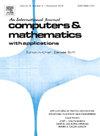Performance comparison of variable-stepsize IMEX SBDF methods on advection-diffusion-reaction models
IF 2.9
2区 数学
Q1 MATHEMATICS, APPLIED
引用次数: 0
Abstract
Advection-diffusion-reaction (ADR) models describe transport mechanisms in fluid or solid media. They are often formulated as partial differential equations that are spatially discretized into systems of ordinary differential equations (ODEs) in time for numerical resolution. This paper investigates the performance of variable stepsize, semi-implicit, backward differentiation formula (VSSBDF) methods of up to fourth order for solving ADR models employing two different implicit-explicit splitting approaches: a physics-based splitting and a splitting based on a dynamic linearization of the resulting system of ODEs, called jacobian splitting in this paper. We develop an adaptive time-stepping and error control algorithm for VSSBDF methods up to fourth order based on a step-doubling refinement technique using estimates of the local truncation errors. Through a systematic comparison between physics-based and Jacobian splitting across six ADR test models, we evaluate the performance based on CPU times and corresponding accuracy. Our findings demonstrate the general superiority of Jacobian splitting in several experiments.
变步长IMEX SBDF方法在平流-扩散-反应模型上的性能比较
平流-扩散-反应(ADR)模型描述了流体或固体介质中的传输机制。这些模型通常被表述为偏微分方程,在时间上被空间离散化为常微分方程(ODE)系统,以便进行数值解析。本文研究了四阶以下可变步长、半隐式、反向微分公式(VSSBDF)方法的性能,这些方法采用两种不同的隐式-显式拆分方法求解 ADR 模型:一种是基于物理的拆分,另一种是基于所得 ODE 系统动态线性化的拆分,本文称之为 jacobian 拆分。我们利用对局部截断误差的估计,为四阶以下的 VSSBDF 方法开发了一种基于步长加倍细化技术的自适应时间步进和误差控制算法。通过在六个 ADR 测试模型中对基于物理的分割和雅各布分割进行系统比较,我们评估了基于 CPU 时间和相应精度的性能。我们的研究结果表明,雅各布分割法在多个实验中具有普遍优势。
本文章由计算机程序翻译,如有差异,请以英文原文为准。
求助全文
约1分钟内获得全文
求助全文
来源期刊

Computers & Mathematics with Applications
工程技术-计算机:跨学科应用
CiteScore
5.10
自引率
10.30%
发文量
396
审稿时长
9.9 weeks
期刊介绍:
Computers & Mathematics with Applications provides a medium of exchange for those engaged in fields contributing to building successful simulations for science and engineering using Partial Differential Equations (PDEs).
 求助内容:
求助内容: 应助结果提醒方式:
应助结果提醒方式:


